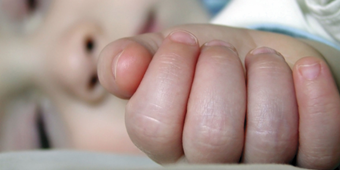Nursing Your Baby, Nurturing Yourself

Find Your Perfect Match
Answer a few questions and we'll provide you with a list of primary care providers that best fit your needs.
The first time you bring your newborn baby skin to skin and nurse her – you will hold that moment close forever. It may make you cry with the wonder of it even years later. But, you may also cry when you’re overwhelmed by nursing in the early days. Breastfeeding has a way of bringing out all the big emotions – both happy and hard.
Choosing to nurse your baby, in many ways, is making a choice to nurture yourself, physically and emotionally. But that doesn't mean it's easy, or that there aren't exceptions. Maria Greene, RN, BSN, IBCLC, of Miami Valley Hospital reflects, "You need to commit to get through the rough spots. I tell people to take a deep breath and give themselves three weeks, taking one feeding at a time."
Emotional Impact of Breastfeeding
Breastfeeding delivers some big emotional benefits through the hormones it triggers. Oxytocin is “a bonding hormone that brings out those maternal feelings and attachments and gives you that deep love for your baby," Greene explains. Prolactin makes you feel more calm and peaceful. Greene says studies show breastfeeding mothers may even get more restful sleep because of drowsiness from prolactin!
Other benefits may not be as measurable. But that doesn't make them less valuable. A baby that does not get sick as often, not paying for formula, the payoff in your child’s future health – these realities can give you peace of mind. Greene cites mothers with babies in the NICU (Neonatal Intensive Care Unit) who take great comfort in being able to help their babies by breastfeeding or providing breastmilk for their babies.
The breastfeeding relationship also brings the benefit of touch. In the internet age, virtual connections on social media often replace physical ones, Greene says. "People need human touch. And not just the baby; the mother, too. She gets unconditional love from her baby. and the benefit of the close physical bond.”
Still, breastfeeding isn’t always easy. Many mothers worry about the baby getting enough milk. This worry can cause anxiety, stress and discouragement. It's important to learn what is normal and to know that you can always call a lactation consultant to get good advice. Greene recommends you trust the process. "95 percent of women can make enough milk for their babies," she says.
Breastfeeding has a way of bringing out all the big emotions – both happy and hard.
Emotional Pressures and Breastfeeding
It’s important for all mothers to guard their emotional health. You should know the difference between baby blues and postpartum depression. If you need medication for depression, you don’t have to stop nursing in order to take it. Check with your baby’s doctor for specific recommendations.

Greene recognizes that although research supports breastfeeding as the optimal nutrition for babies, there are times that formula is used for medical or personal reasons. “Our goal as lactation consultants is to educate parents and help you meet your feeding goals,” she says. If you’re bottle feeding, she encourages you not to overlook the power of touch, adding, "There are so many ways to nurture your baby regardless of your feeding choice. Singing, stroking and cuddling with her, you will show your love her in all sorts of ways."
On the other hand, breastfeeding mothers can also get a lot of outside pressure in a culture where bottle feeding is still the norm. Nursing a baby longer than “normal” can draw criticism. If you're nursing past what someone else thinks is acceptable and getting negative feedback, "Be confident in your decision to provide what is best for your baby,” Greene advises.
Find Your Perfect Match
Answer a few questions and we'll provide you with a list of primary care providers that best fit your needs.
Source: Healthychildren.org; La Leche League International.





